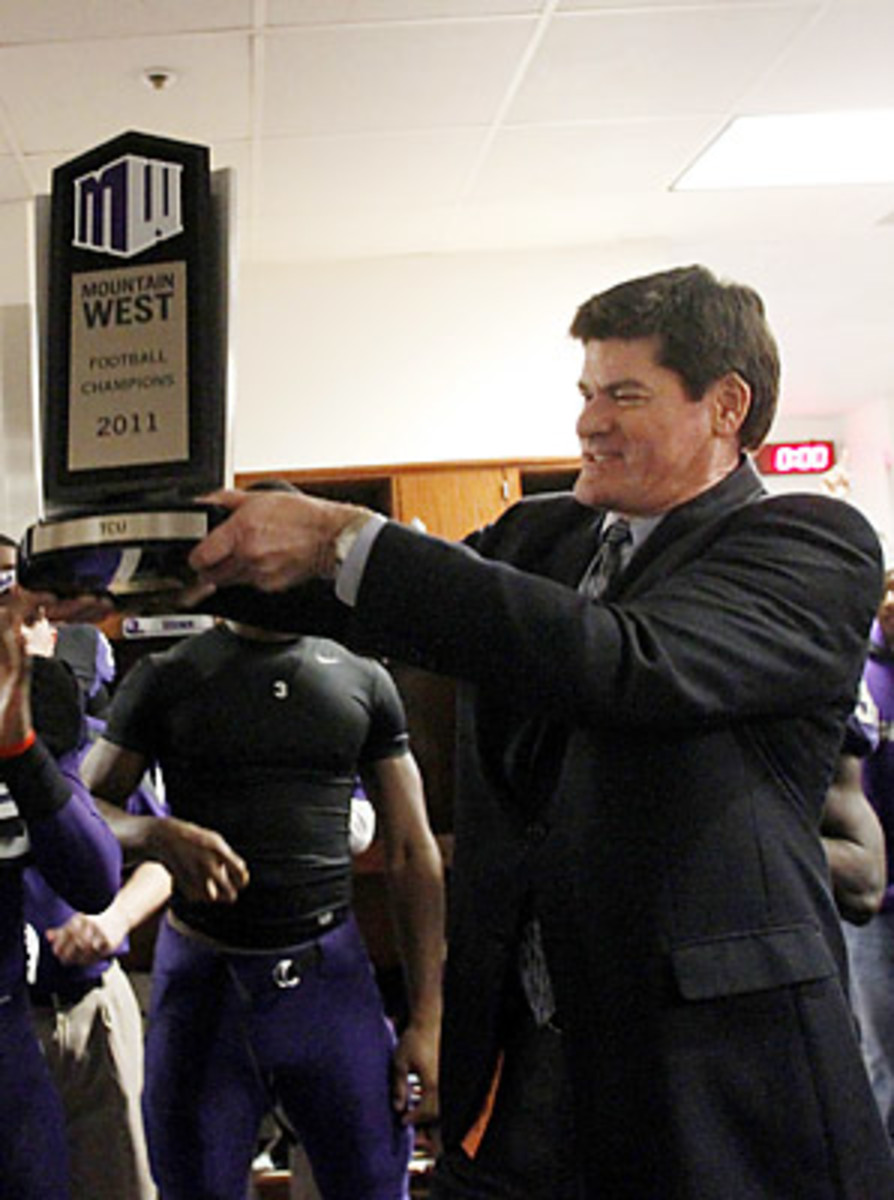Questions remain as BCS continues debate for revamped postseason
DALLAS -- If you've been following the news since January that the BCS commissioners are discussing a potential four-team playoff for the 2014 season and beyond, you've undoubtedly wondered about such details as, where and when would the games be played? And how would the teams be selected?
Well, BCS honchos are asking the exact same thing back.
Following an all-day meeting here Monday at a hotel adjacent to the Dallas-Fort Worth International Airport, the BCS released a statement declaring that, "our talks have entered the 'brass tacks' level," which included a hefty paragraph littered with questions.
For example, if we change the current format, would we play some games on campus or all games on neutral sites? If some games are on campus, is that too much of a competitive advantage? If all games are at neutral sites, would fans be able to travel to two games in a row? How would teams be selected? By a committee, by the current ranking formula, or by a different formula? When exactly would games be scheduled, considering finals, holidays and our desire to avoid mid-January games?
"It's a fascinating discussion," said MAC commissioner Jon Steinbrecher. It better be, after the group voluntarily spent nearly eight hours bunkered down in a windowless conference room on a sunny, 85-degree day.
Monday marked the third time this year the 11 FBS commissioners and Notre Dame AD Jack Swarbrick have met to discuss the future of college football's postseason, previously convening Jan. 10 in New Orleans (the day after the BCS championship game) and Feb. 21-22 in Dallas. In talking to several people in the room Monday, here in a nutshell is where they stand:
• While most recent coverage has focused on some form of a seeded four-team playoff, "The pure plus one is still being talked about," said BCS Executive Director Bill Hancock. That would be an unseeded model where the championship game pits the top two teams standing after the traditional bowls.
• Hancock and two commissioners insisted the current standalone title game remains in play, but that's likely just to appease any university presidents that may still need convincing of a radical change. There were two highly paid television consultants (Chuck Gerber and Dean Jordan) in the room Monday; the commissioners don't need those guys to tell them how much their current system is worth.
• Any notion of a possible eight- or 16-team field is all but dead -- but you already knew that.
• Monday's meeting centered almost entirely around the what, the when, and the where -- but not who. For all the public debate, they haven't yet addressed as a group the issue of whether a playoff would be restricted to conference champions, as the Pac-12 and others have advocated. Not that they don't have their own personal opinions.
"You should have to win something," said Mountain West commissioner Craig Thompson. "You should be a champion to get into this type of system."
"When you get to [limiting it to] conference champions, you're not necessarily dealing with the best teams," said SEC commissioner Mike Slive. "You're creating more of a tournament than playing for the national championship."
• The commissioners seem most torn on whether potential semifinal games should be played at home stadiums (as proposed by the Big Ten) or neutral sites. Take this exchange with Thompson, an outspoken advocate in the past of a full-blown, NFL-style playoff:
On neutral sites: "I understand the logistics of trying to move 8, 10, 12,000 fans once, let alone twice," he said. "In the bowl system they have a month to prepare, figure out a way to get there. It will be extremely challenging to move large sections of fans [twice]."
So home games, then? "Well, then you get into the weather and traveling advantages. And what a fine line. Let's say, however you determine the rankings, the No. 2 and 3 teams were [separated] by .014 percent. But now [No. 3], you have to go there instead of playing that game at home."
Don't get your hopes up that they'll resolve this stuff anytime soon.
In the past, BCS leaders have agreed in principle to their next contract at their annual spring meetings, which includes not just the commissioners but athletic directors, bowl and television executives. This year's take place April 24-26 in Hollywood, Fla. Asked whether any decisions will be made by then, Hancock flatly said: "No."
Any proposal the commissioners come up with will need to then be approved by each conference's presidents at their respective league meetings in late May and early June. The group is expected to then reconvene in Chicago later in June. And there's been talk that even then nothing will be finalized until late summer.
"There isn't anything that doesn't have some advantage and a corresponding disadvantage," said Slive. "In the final analysis, when the time comes, we'll have to make a decision. That time is not now."
That time will come eventually, in some other conference room in some other hotel. Hopefully the press release on that day will contain answers, not questions.






